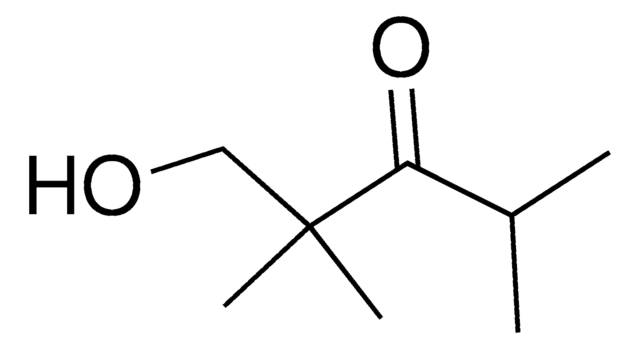537535
2-(2-Butoxyethoxy)ethyl acetate
≥99.2%
Synonym(s):
Butyldiglycol acetate, Diethylene glycol monobutyl ether acetate
About This Item
Recommended Products
Quality Level
Assay
≥99.2%
form
liquid
autoignition temp.
393 °F
expl. lim.
0.76 %, 135 °F
10.7 %, 203 °F
impurities
≤0.10% (water)
refractive index
n20/D 1.423 (lit.)
bp
245 °C (lit.)
mp
-32 °C
solubility
water: soluble 65 g/L at 20 °C
density
0.978 g/mL at 25 °C (lit.)
SMILES string
CCCCOCCOCCOC(C)=O
InChI
1S/C10H20O4/c1-3-4-5-12-6-7-13-8-9-14-10(2)11/h3-9H2,1-2H3
InChI key
VXQBJTKSVGFQOL-UHFFFAOYSA-N
Looking for similar products? Visit Product Comparison Guide
General description
Application
Signal Word
Warning
Hazard Statements
Precautionary Statements
Hazard Classifications
Eye Irrit. 2
Storage Class Code
10 - Combustible liquids
WGK
WGK 1
Flash Point(F)
215.6 °F - closed cup
Flash Point(C)
102 °C - closed cup
Choose from one of the most recent versions:
Already Own This Product?
Find documentation for the products that you have recently purchased in the Document Library.
Customers Also Viewed
Our team of scientists has experience in all areas of research including Life Science, Material Science, Chemical Synthesis, Chromatography, Analytical and many others.
Contact Technical Service


![[2-(2-Butoxyethoxy)ethyl] acetate for synthesis](/deepweb/assets/sigmaaldrich/product/images/380/792/14a1bc60-0ae8-4fca-88b2-8d3863235e4c/640/14a1bc60-0ae8-4fca-88b2-8d3863235e4c.jpg)












